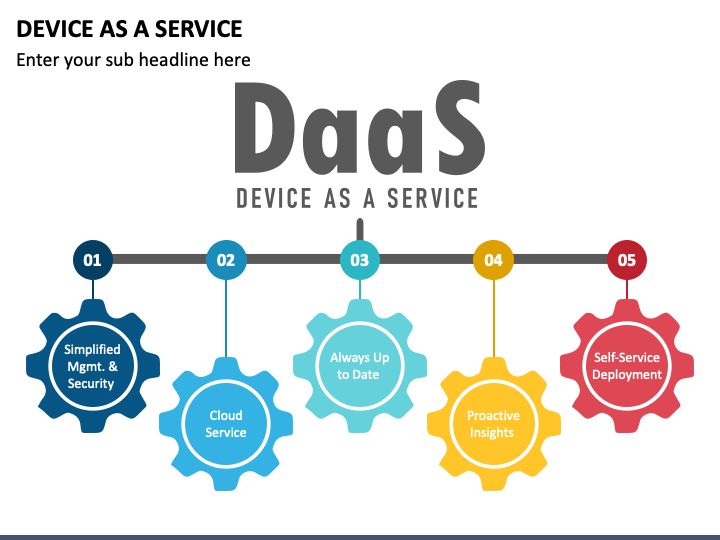Device as a Service (DaaS) Market: An In-Depth Overview
Market Overview
The Device as a Service (DaaS) market has emerged as a transformative trend in the technology industry, offering businesses a comprehensive solution for managing and maintaining their IT hardware. DaaS provides organizations with the ability to lease devices—such as laptops, desktops, tablets, and smartphones—along with a suite of services including deployment, management, and support. This model helps companies reduce the burden of IT management, optimize costs, and ensure up-to-date technology.
The Device as a Service industry is projected to grow from USD 68.3 billion in 2022 to USD 425.6 billion by 2030, exhibiting a compound annual growth rate (CAGR) of 25.7% during the forecast period (2024 - 2030).
Request To Free Sample of This Strategic Report - https://www.marketresearchfuture.com/sample_request/4486
Key Market Segments
-
Device Type:
- Desktops and Laptops: The most common devices offered under DaaS, crucial for everyday business operations.
- Tablets and Smartphones: Increasingly popular, especially with the rise of mobile workforces.
- Others: Includes specialized devices like point-of-sale (POS) systems and wearables.
-
Deployment Mode:
- Cloud-Based: Provides greater flexibility and scalability, allowing for remote management and updates.
- On-Premises: Preferred by organizations with strict compliance and security requirements.
-
End-User:
- Large Enterprises: Adopt DaaS to streamline IT management and reduce capital expenditures.
- Small and Medium Enterprises (SMEs): Utilize DaaS for cost-effective access to the latest technology without large upfront investments.
- Education: Schools and universities implement DaaS to provide students and staff with necessary devices and support.
-
Industry Vertical:
- IT and Telecommunications: Leading adopters of DaaS for managing extensive IT infrastructure.
- Healthcare: Employs DaaS for secure and efficient device management in clinical settings.
- Retail: Uses DaaS to maintain POS systems and enhance customer service.
- Manufacturing: Relies on DaaS to support automation and operational efficiency.
Industry Latest News
The DaaS market is dynamic, with frequent innovations and strategic moves by key players:
- AI and Automation Integration: Companies are incorporating artificial intelligence (AI) and automation to enhance device management, predictive maintenance, and security.
- Sustainability Initiatives: Increasing focus on sustainability, with companies offering eco-friendly device recycling and energy-efficient solutions.
- Strategic Partnerships and Acquisitions: For instance, Dell Technologies' collaboration with VMware aims to deliver integrated DaaS solutions that streamline IT management.
- Enhanced Security Features: Emphasis on robust security protocols and features, such as endpoint security, data encryption, and regular updates, to protect against cyber threats.
Key Companies
Several prominent companies dominate the DaaS market, each contributing to its growth and evolution:
- HP Inc.: A pioneer in the DaaS market, offering a comprehensive suite of devices and services, focusing on security, lifecycle management, and analytics.
- Dell Technologies: Provides a wide range of devices and DaaS solutions, emphasizing integrated services and enterprise-grade security.
- Lenovo: Known for its flexible DaaS offerings, catering to both large enterprises and SMEs with customizable plans.
- Apple Inc.: Offers DaaS for its popular devices, including iPads and MacBooks, appealing to education and creative sectors.
- Microsoft: Combines its Surface devices with DaaS solutions, leveraging its cloud capabilities and enterprise software.
- Hewlett Packard Enterprise (HPE): Focuses on enterprise customers, providing robust IT infrastructure and device management services.
Market Drivers
Several factors are fueling the growth of the DaaS market:
- Increasing Remote Work Trends: The rise of remote and hybrid working models has accelerated the demand for managed devices that can be deployed and maintained remotely.
- Cost Efficiency: DaaS helps organizations reduce capital expenditure by converting it into operational expenditure, providing financial flexibility.
- Scalability and Flexibility: Businesses can scale their device usage up or down based on demand, ensuring they only pay for what they need.
- Focus on Core Competencies: By outsourcing device management, companies can focus more on their core business activities and strategic initiatives.
- Enhanced Security: Continuous monitoring and regular updates provided by DaaS solutions ensure higher security and compliance standards.
Ask for Customization - https://www.marketresearchfuture.com/ask_for_customize/4486
Regional Insights
The DaaS market shows significant variation across different regions, driven by factors like technology adoption, economic conditions, and regulatory environments:
- North America: The largest market for DaaS, driven by high technology adoption rates, strong presence of key players, and the rapid shift towards remote working models. The U.S. leads the region with significant investments in IT infrastructure.
- Europe: Demonstrates strong growth, particularly in countries like the UK, Germany, and France. The region's focus on digital transformation and sustainability is driving DaaS adoption.
- Asia-Pacific: The fastest-growing market, with countries like China, Japan, and India leading the charge. Rapid industrialization, growing IT sector, and increasing awareness of DaaS benefits contribute to market growth.
- Latin America: Emerging as a promising market due to increasing digitalization efforts and the growing need for cost-effective IT solutions. Brazil and Mexico are key players in the region.
- Middle East & Africa: Gradual growth observed as businesses in the region begin to recognize the advantages of DaaS. Investments in IT infrastructure and economic diversification initiatives are driving market expansion.
Conclusion
The Device as a Service (DaaS) market is on a trajectory of rapid growth and transformation. As businesses increasingly seek flexible, scalable, and cost-effective IT solutions, DaaS stands out as a game-changer. With continuous advancements in technology, strategic partnerships, and a growing emphasis on security and sustainability, the DaaS market is poised to become an integral part of the global IT landscape. Companies across various industries and regions are expected to leverage DaaS to enhance their operational efficiency, reduce costs, and stay competitive in a rapidly evolving digital world
Device as a Service Market Highlights:



